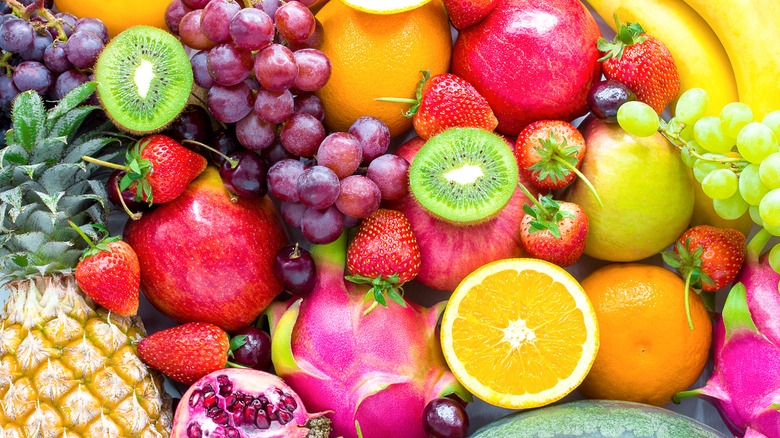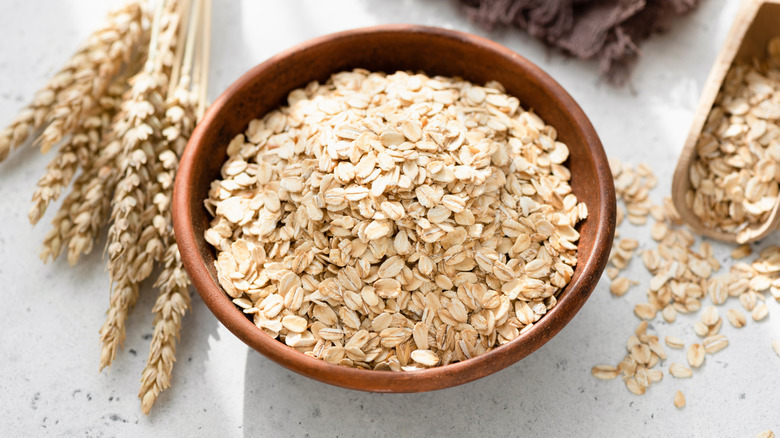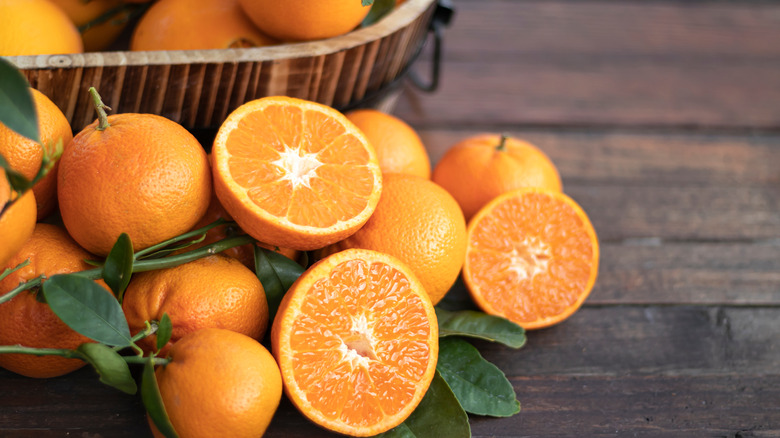The Best Anti-Aging Food Your Skin Needs
Aging is a natural process everybody goes through, but there are ways to slow down the process and age gracefully. The good news is that it's easier than you would think. While there may not be a "fountain of youth," you can treat yourself to a "platter of youth" by eating food that could have anti-aging effects. To begin, you should avoid eating food that is high in sugars. According to The Journal of Clinical and Aesthetic Dermatology, sugar can lead to the loss of skin elasticity and saggy skin, as it can affect the structure of collagen and elastic fibers in the skin.
Specifically, sugar can cause glycation, in which the sugar sticks to the proteins in your body's cells and produces advanced glycation end products (AGEs) (via Elle). AGEs can literally age your skin by stiffening the collagen and elastin fibers, which leads to wrinkles. The way you cook your food can also lead to an increase of AGEs — things like grilling, frying, or roasting. On the flip side, there are several herbs and spices that can block the production of AGEs like oregano, cinnamon, cloves, ginger, and garlic (via The Journal of Clinical and Aesthetic Dermatology). Certain fruits and vegetables, which contain lipoic acid, can also have the same effect.
Eating good carbs and fats can help prevent wrinkles
Avoiding sugar is critical, but that doesn't mean all carbohydrates are bad. The key is to eat low-glycemic carbohydrates, which won't cause a drastic increase in your blood sugar levels (per WebMD). Dermatologist Debra Jaliman told WebMD, "I recommend complex carbohydrates like oats because they're low-glycemic." Jaliman states that high-glycemic carbohydrates like white rice can cause acne and wrinkles. Oats also have a compound that prevents skin damage. Barley and brown rice are other great low-glycemic options.
Avocado and olive oil are unsaturated fats, or "good fats" that are beneficial for your heart health, per Harvard School of Public Health. They also help your skin retain moisture and aid in absorbing vitamins (via WebMD). Avocados also contain vitamin A, which can help promote skin cell regeneration and leave a healthy fresh glow to the face, as well as carotenoids which protect your skin from sun damage. Chia and flax seeds have omega-3 fats, a type of unsaturated fat that has anti-inflammatory properties and can prevent the proliferation of skin cancer cells. (via Healthline and WebMD).
Per WebMD, eggs and beans contain proteins that help boost collagen production. Another source of proteins you need to incorporate is (literally) nuts. Several types of nuts contain vitamin E, which is especially crucial for the skin. Vitamin E works to prevent UV damage and preserve moisture in the skin, per Healthline. A deficiency in vitamin E can even possibly result in dry, flaky skin (via NDTV).
Vitamins are vital for healthy, glowing skin
Vitamin C is one of the most popular skincare ingredients, as it helps reverse hyperpigmentation and produce collagen. Eating oranges and tomatoes are a great source of vitamin C and are high in water content, which helps hydrate the skin (via Healthline). Pomegranate seeds also contain vitamin C, antioxidants that prevent free radical damage, and punicalagins. Punicalagins are compounds that help retain the collagen in your skin.
In addition to vitamin C, red bell peppers contain carotenoids, which are antioxidants that protect your skin from UV exposure and pollution. Blueberries contain an antioxidant named anthocyanin, as well as vitamins A and C. Anthocyanin prevents collagen loss, as well as damage from sun exposure and pollution. Beta-carotene is an antioxidant present in sweet potatoes that converts to vitamin A. Sweet potatoes also contain vitamins C and E, which make it the ultimate powerhouse for glowy, even, firm skin.
Another powerhouse ingredient is watercress. This leafy green contains vitamins A and C, as well as antioxidants. Watercress improves the circulation of minerals to your body's cells, which in turn increases the oxygen levels in your skin, per Healthline. Watercress also kills off microorganisms within your skin. Speaking of leafy greens, spinach isn't just for Popeye-like strength (via Economic Times and Healthline). It can also help hydrate and oxygenate the skin and contains vitamins A, C, and K. Vitamin K can help reduce skin inflammation.


